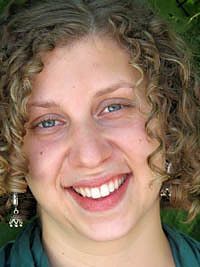When I traveled to Ghana with AJWS during the summer of 2005, I was seeking a challenging experience. I hoped it would be an opportunity to learn, through mind and body, just a little bit about what it means to live in the Global South. I did not know just how challenging it would be; how it would force me to look at the world and myself differently; how painful it would be to see the injustice of poverty up close. Yet it is critical to seek out productive discomfort such as this, and to let the experience stay with us, change us and shape us, and lead us to action.
Jacob experiences such a life-changing encounter in Parshat Vayishlach. The night before his reconciliation with Esau, he finds himself alone and wrestles with a “man” whom the commentaries have commonly viewed to be an angel. The wrestling match is typically understood as an attack on Jacob by the angel, but Aviva Zornberg suggests that Jacob may have sought out the confrontation.[1] Zornberg’s interpretation of Jacob as the instigator, stemming from a grammatical reading of the text, presents a radically different understanding of this mysterious scene: Jacob has left the comfort zone of his family and actively grapples with the unknown. The commentaries offer many interpretations for what this encounter means, but all agree that Jacob is fundamentally changed by it.
During their wrestling, the angel injures Jacob’s thigh. Some commentators say that he will always limp, and the pain stays with him the rest of his life.[2] Jacob learns that it is not enough to have had this strange and intense experience. He says to the angel, “I will not let you go, unless you bless me.”[3] The blessing he receives is a new name, one fitting to the experience: he will be called Israel “because [he] has striven with beings divine and human.”[4] Because of Jacob’s name change, his identity is now intertwined with this encounter and he becomes defined by it: as someone who “strives”—or struggles—with both the moral and the human.
Our own moral and human struggles—like my transformative encounter in Ghana—are rarely marked with physical pain or public changes. Yet they are often emotionally painful and visceral. We feel the pain of new and uncomfortable knowledge. Visiting the Global South, we learn that rights that we take for granted, such as education, are not afforded to all. We realize that millions of children are malnourished. We witness the debilitating effects of lack of health care. And perhaps most painfully, we realize that our societies are complicit in these injustices. And though the pain dulls, as did Jacobs’, we carry with us the emotional scars.
Our challenge, since we are lacking something as concrete as a new name or a limp, is to retain the sharpness and urgency of life-changing experiences that tend to fade over time when we return to every-day life. We need a way to hold on to these experiences, to make our discomfort productive, to lead us to take action. Zornberg goes on to say that “[Jacob] wants to become Israel, by mastering the angel. The wrestling match is an occasion for clarification, for discovery of the parameters of personal power.”[5] Our own wrestling with injustice should help us gain clarity and discovery; to find our full “personal power” as change-makers.
One way to do this is to share the experience and help others to be transformed. While Jacob’s injured thigh was an internal reminder of his transformative encounter, his change of name was a public sign that would become the name for the entire Jewish people. In this case, the power of an individual’s experience affects the consciousness of the collective. We learn from this that it is not enough to wrestle alone; rather, we must push others within our communities and governments to act as well.
Let us not only witness hunger, disease and poverty. Let us be transformed by what we have encountered and, with our communities, let us go to our personal limits to seek domestic and global change. The name “Israel” is descriptive and prescriptive. To be a Jew is to be as Jacob: to struggle, to be transformed and stretched by experience, and to inspire a nation defined by action.
And as Jacob realizes when he says, “I have seen a divine being face to face”, the struggle is holy.
[1] Zornberg, Aviva Gottlieb. The Beginning of Desire: Reflections on Genesis, New York: Doubleday Dell Publishing Group, Inc., 1995, p.234
[2] Ibid
[3] Bereshit 32:27
[4] Bereshit 32:29
[5] Zornberg, p. 235

